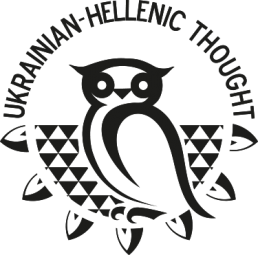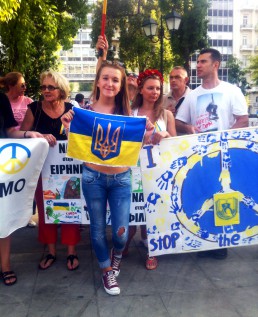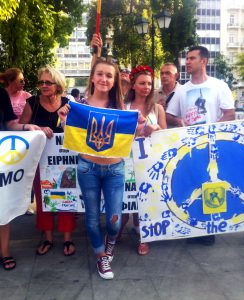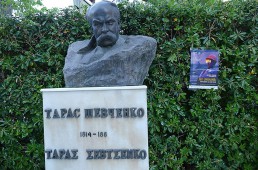SEE UKRAINE. DOCUDAYS UA ON TOUR. GREECE, ATHENS, comments about suspending the second part of the project See Ukraine
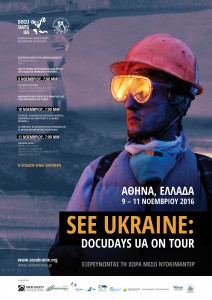 Radical leftists baffle Docudays UA screenings in Athens
On May 13, the project SEE UKRAINE: DOCUDAYS UA ON TOUR started in Athens. On the eve of the opening the managers of the Exile Room, the main festival venue in Greece, refused to host the festival events after radical groups' call for a protest rally near the location. The organizers addressed the Embassy of Ukraine to the Hellenic Republic urgently with a request to host the screenings and discussions in its premises.
In the evening of May 13, while the film "Euromaidan. Rough Cut" was being screened at the opening of the festival, the rally of pro-Russian forces, who called themselves "Greek anti-fascists", gathered next to the Exile Room. After the meeting, a group of young people headed towards the gallery which would have to host the Ukrainian photographer Oleksandr Hliadelov's exhibition "Hey, brother?". They threatened the gallery owners and accused them of supporting the Ukrainian nazis.
It is reported that the local radical sources spread false information about the project "See Ukraine", distort the facts and accuse the organizers of the attempts to slander the residents of Crimea and Donbas, although the program contains no films on a similar topical.
"Through the example of cultural diplomacy initiative of the Docudays UA we have seen how the information campaign against Ukraine is being waged and how it is important not to succumb to provocations and not to believe that the Greeks are hostile to Ukrainians. They are not. Pro-Russian forces deliberately create this myth, trying to quarrel two countries with each other. This is why we held the first part of the festival in Greece despite the difficulties," said Olha Birzul, the PR-coordinator of the project "See Ukraine: Docudays UA on Tour."
During three days, the viewers in Athens had the opportunity to watch short films of Ukrainian filmmakers: "Doctor comes last" by Svitlana Shymko and "Sirs and signors" by Oleksandr Techynsky. Moreover, the discussion "Where is Ukraine heading after Euromaidan" was held, involving Ukrainian-Greek experts: philosopher Volodymyr Yermolenko, journalist Tetyana Oharkova, Greek professor of geostrategy Nikos Liheros and historian Michalis Varlasa.
"First of all, we were impressed by how much the audience was interested in the discussion. The people had a lot of questions concerning the state of affairs in Ukraine, fighting against corruption, power of the Ukrainian civil society, as well as Russian aggression, causes of the annexation of Crimea and the future of the Donbas, - says Tetyana Ogarkova (Ukraine Crisis Media Center, Hromadske TV). – Also, we talked about difficultues in explaining the pro-European choice of Ukraine in Greece, a country with a strong Eurosceptic background."
"We should continue to do everything possible to convey information about Ukraine to the international audience. It is important to speak of the power of Ukrainian society, the rise of a new Ukraine, and the nature of Russian aggression that threatens the entire world order," said Volodymyr Yermolenko, the member of the NGO "Internews-Ukraine."
The festival team truly appreciates the assitance of the Association of the Ukrainian Diaspora in Greece "Ukrainian - Hellenic Thought" in organizing the film screenings of SEE UKRAINE: DOCUDAYS UA ON TOUR, as well as the Ukrainian Embassy which agreed to host the events.
For the time being the team of SEE UKRAINE has suspended the second part of the project, scheduled for May, 26-28, with the aim of finding more secure venues.
Radical leftists baffle Docudays UA screenings in Athens
On May 13, the project SEE UKRAINE: DOCUDAYS UA ON TOUR started in Athens. On the eve of the opening the managers of the Exile Room, the main festival venue in Greece, refused to host the festival events after radical groups' call for a protest rally near the location. The organizers addressed the Embassy of Ukraine to the Hellenic Republic urgently with a request to host the screenings and discussions in its premises.
In the evening of May 13, while the film "Euromaidan. Rough Cut" was being screened at the opening of the festival, the rally of pro-Russian forces, who called themselves "Greek anti-fascists", gathered next to the Exile Room. After the meeting, a group of young people headed towards the gallery which would have to host the Ukrainian photographer Oleksandr Hliadelov's exhibition "Hey, brother?". They threatened the gallery owners and accused them of supporting the Ukrainian nazis.
It is reported that the local radical sources spread false information about the project "See Ukraine", distort the facts and accuse the organizers of the attempts to slander the residents of Crimea and Donbas, although the program contains no films on a similar topical.
"Through the example of cultural diplomacy initiative of the Docudays UA we have seen how the information campaign against Ukraine is being waged and how it is important not to succumb to provocations and not to believe that the Greeks are hostile to Ukrainians. They are not. Pro-Russian forces deliberately create this myth, trying to quarrel two countries with each other. This is why we held the first part of the festival in Greece despite the difficulties," said Olha Birzul, the PR-coordinator of the project "See Ukraine: Docudays UA on Tour."
During three days, the viewers in Athens had the opportunity to watch short films of Ukrainian filmmakers: "Doctor comes last" by Svitlana Shymko and "Sirs and signors" by Oleksandr Techynsky. Moreover, the discussion "Where is Ukraine heading after Euromaidan" was held, involving Ukrainian-Greek experts: philosopher Volodymyr Yermolenko, journalist Tetyana Oharkova, Greek professor of geostrategy Nikos Liheros and historian Michalis Varlasa.
"First of all, we were impressed by how much the audience was interested in the discussion. The people had a lot of questions concerning the state of affairs in Ukraine, fighting against corruption, power of the Ukrainian civil society, as well as Russian aggression, causes of the annexation of Crimea and the future of the Donbas, - says Tetyana Ogarkova (Ukraine Crisis Media Center, Hromadske TV). – Also, we talked about difficultues in explaining the pro-European choice of Ukraine in Greece, a country with a strong Eurosceptic background."
"We should continue to do everything possible to convey information about Ukraine to the international audience. It is important to speak of the power of Ukrainian society, the rise of a new Ukraine, and the nature of Russian aggression that threatens the entire world order," said Volodymyr Yermolenko, the member of the NGO "Internews-Ukraine."
The festival team truly appreciates the assitance of the Association of the Ukrainian Diaspora in Greece "Ukrainian - Hellenic Thought" in organizing the film screenings of SEE UKRAINE: DOCUDAYS UA ON TOUR, as well as the Ukrainian Embassy which agreed to host the events.
For the time being the team of SEE UKRAINE has suspended the second part of the project, scheduled for May, 26-28, with the aim of finding more secure venues.
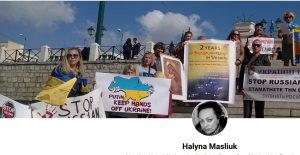
A journalist and the head of the Association of the Ukrainian Diaspora in Greece "Ukrainian - Hellenic Thought"
See Ukraine speaks out against political myths
On the whole, Greeks, just like Ukrainians, receive the lion's share of imformation from unreliable sources. Even so, there is a local saying stating that one image is worth a thousand words. In this respect the festival See Ukraine: Docudays UA on tour seems to be unique for the Greek society and its Ukrainian community. With the help of the expressive cinematic language, the project will share some perspectives on the reality of Ukraine and become a meeting place for experts from both countries, who will talk to the audience about the most uncomfortable and complex issues during topic-based discussions.
Despite the fact that Ukraine and Greece have a thousand-year common history, Greek viewers have very little understanding of the Ukrainian cinema. It is difficult to embrace all the history, which famously starts in the Monastery of Great Lavra (Mount Athos), where the first written record about the Kyivan Russian monkhood is kept. During the year of the Soviet Iconoclasm any references to the importance of Athos for the Ukrainian culture and spirituality were denied. Possibly, because of this spiritual commonality, Ukrainian and Greek community have always worked closely in different parts of the world.
The lack of information about Ukraine is also related to the fact that Greece traditionally belongs to the sphere of influence of Russia. The Greek audience tends to be benevolent to the Russian media sources and has a vague, if not misleading, notion about Ukraine, repeating the myths that the Ukrainian language and state have never existed. For decades, social thinking in Greece has been influenced by the Soviet documentary and feature films which have also systematically been broadcast for the past 25 years after the collapse of the Soviet empire and during the establishment of the independent Ukrainian state. The new waves of the Russian propaganda, which have become part of the so-called hybrid war 2014-2016, make the Greek society even more misinformed. Greece which is also going through a severe political and economic crises is misled into believing that Russia, "friendly nation which shares the same religion", is willing to come to the rescue.
The passionate activism of the Ukrainian community in Greece looks uncomfortable, if not merely incomprehensible, to the majority of Greeks, as this political position disproves the Russian propaganda interpretation according to which Ukrainians in East Ukraine have rebelled against fascism. One needs to cope with this, break the stereotypes, search for information, even change one's mindset. It is really complicated. Why should the Ukrainians be a separate nation? Why should they speak their native language? Why should they fight for their independence? However, freedom and struggle for independence are essential concepts for Greeks. In this respect, Greek Ukrainians' position causes a lot of anxiety in the Greece.
The beginning of the open military aggression of Russia towards Ukraine in 2014 acted as a catalyst for political activism of Ukrainians all over the world. Greece was not an exception. The majority of Ukrainians from different regions of the country became conscious of their national identity. They realized that they want their native land to remain independent, to embrace European democratic values and get rid of the oppressive Soviet legacy. They took to the streets of Athens with blue-and-yellow flags, wearing vyshyvankas and wreaths and holding posters with slogans against the Russian aggression, against the annexation of Crimea and in support of the illegally imprisoned hostages of the Kremlin. They created a powerful volunteer movement and launched an information website. Freedom is undoubtedly above all else for any nation. And now Ukrainians feel proud of their land and their heroes, who are willing to die for the freedom of Ukraine. And the members of our Ukrainian community do their best to inform the Greek society about Ukraine and its heroic people. That is why See Ukraine: Docudays UA on tour must come to Greece.
Ліворадикальні угрупування в Афінах перешкоджають показам Docudays UA
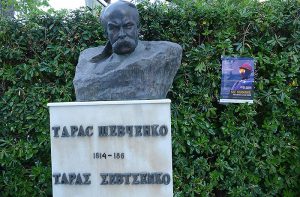
13 травня проект «Побачити Україну: Docudays UA мандрує світом» стартував в Афінах. У ніч перед відкриттям менеджери Exile Room, головної фестивальної локації у Греції, відмовилися проводити фестиваль на своїй території, злякавшись заклику радикальних угрупувань зібратися на мітинг протесту під стінами закладу. У екстреному порядку організатори заходу були змушені звернутися до Посольства України в Греції з проханням провести покази і дискусії у їхньому приміщенні.
Увечері 13 травня паралельно з відкриттям, на якому був показаний фільм «Євромайдан. Чорновий монтаж», під стінами Exile Room усе ж таки зібрався мітинг за участі проросійських сил, які називають себе «грецькими антифашистами». Після мітингу колона молодиків рушила у бік галереї, де за тиждень мусила відкритися фотовиставка Олександра Глядєлова «Чуєш, брате?». Вони залякували власників галереї і звинувачували їх у підтримці українських нацистів.
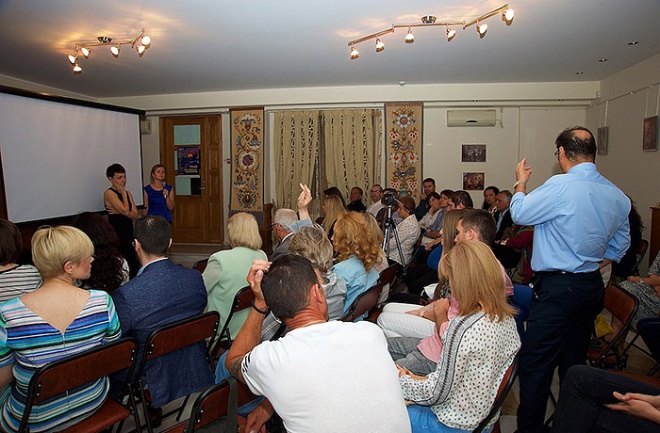 Показ «Побачити Україну: Docudays UA мандрує світом» у Посольстві України в Греції
Наразі місцеві радикальні джерела поширюють про проект «Побачити Україну» неправдиву інфомацію, перекручують факти і звинувачують у намаганні оббрехати жителів Криму і Донбасу. Хоча у програмі показів немає жодного фільму на подібну тему.
«На прикладі ініціативи Docudays UA з культурної дипломатії ми побачили, як ведеться інформаційна кампанія проти України і як важливо не піддаватися на провокації і не вірити, що греки ворожо ставляться до українців. Це не так. Проросійські сили зумисне створюють цей міф, намагаючись пересварити між собою два народи. Саме тому, незважаючи на труднощі ми провели першу частину фестивалю у Греції», - пояснює Ольга Бірзул, pr-менеджерка «Побачити Україну: Docudays UA мандрує світом».
Показ «Побачити Україну: Docudays UA мандрує світом» у Посольстві України в Греції
Наразі місцеві радикальні джерела поширюють про проект «Побачити Україну» неправдиву інфомацію, перекручують факти і звинувачують у намаганні оббрехати жителів Криму і Донбасу. Хоча у програмі показів немає жодного фільму на подібну тему.
«На прикладі ініціативи Docudays UA з культурної дипломатії ми побачили, як ведеться інформаційна кампанія проти України і як важливо не піддаватися на провокації і не вірити, що греки ворожо ставляться до українців. Це не так. Проросійські сили зумисне створюють цей міф, намагаючись пересварити між собою два народи. Саме тому, незважаючи на труднощі ми провели першу частину фестивалю у Греції», - пояснює Ольга Бірзул, pr-менеджерка «Побачити Україну: Docudays UA мандрує світом».
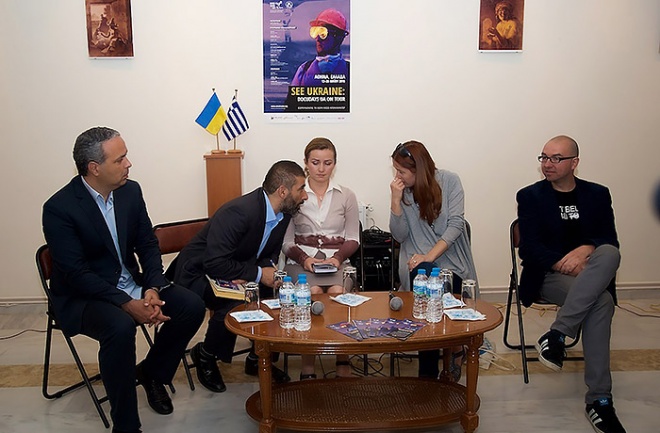 Дискусія «Куди прямує Україна після Євромайдану» у Посольстві України в Греції
Протягом трьох днів глядачі в Афінах мали змогу подивитися фільми «Евромайдан. Чорновий монтаж», короткометражні фільми українських режисерів: «Медик іде останньою» Світлани Шимко та «Сери та сеньйори» Олександра Течинського. Крім того, відбулася дискусія «Куди прямує Україна після Євромайдану» за участі українсько-грецьких експертів: філософа Володимира Єрмоленка, журналістки Тетяни Огаркової, грецького професора з геостратегії Нікоса Лігероса та історика Міхаліса Варласа.
«Дискусія вразила, перш за все, зацікавленістю аудиторії. У людей було багато питань щодо стану справ в Україні, боротьби з корупцією, сили українського суспільства, а також російської агресії, причин анексії Криму та майбутнього Донбасу, - говорить Тетяна Огаркова (Український кризовий медіа центр, Громадське ТБ). - Ми говорили також про складнощі пояснення європейського вибору України в Греції - країні з потужними євроскептичними настроями».
«Нам треба продовжувати робити все можливе для донесення інформації про Україну міжнародній аудиторії. Важливо говорити як про силу українського суспільства, про постання нової України, - так і про природу російської агресії, яка загрожує усьому світовому порядку», - наголошує Володимир Єрмоленко (Інтерньюз-Україна, Громадське ТБ).
Дискусія «Куди прямує Україна після Євромайдану» у Посольстві України в Греції
Протягом трьох днів глядачі в Афінах мали змогу подивитися фільми «Евромайдан. Чорновий монтаж», короткометражні фільми українських режисерів: «Медик іде останньою» Світлани Шимко та «Сери та сеньйори» Олександра Течинського. Крім того, відбулася дискусія «Куди прямує Україна після Євромайдану» за участі українсько-грецьких експертів: філософа Володимира Єрмоленка, журналістки Тетяни Огаркової, грецького професора з геостратегії Нікоса Лігероса та історика Міхаліса Варласа.
«Дискусія вразила, перш за все, зацікавленістю аудиторії. У людей було багато питань щодо стану справ в Україні, боротьби з корупцією, сили українського суспільства, а також російської агресії, причин анексії Криму та майбутнього Донбасу, - говорить Тетяна Огаркова (Український кризовий медіа центр, Громадське ТБ). - Ми говорили також про складнощі пояснення європейського вибору України в Греції - країні з потужними євроскептичними настроями».
«Нам треба продовжувати робити все можливе для донесення інформації про Україну міжнародній аудиторії. Важливо говорити як про силу українського суспільства, про постання нової України, - так і про природу російської агресії, яка загрожує усьому світовому порядку», - наголошує Володимир Єрмоленко (Інтерньюз-Україна, Громадське ТБ).
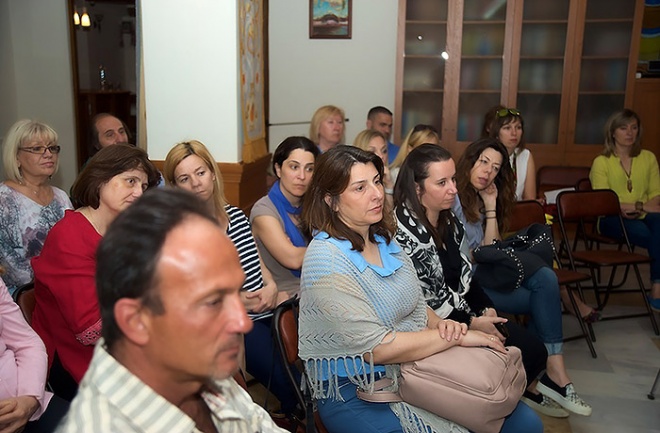 Показ «Побачити Україну: Docudays UA мандрує світом» у Посольстві України в Греції
Команда фестивалю щиро вдячна за допомогу Асоціації української діаспори «Українсько-грецька думка» в організації показів «Побачити Україну: Docudays UA мандрує світом», а також Посольству України, яке надало місце для проведення подій. Наразі команда «Побачити Україну» призупиняє другу частину проекту, заплановану на 26-28 травня, з метою пошуку безпечних локацій.
Стежте за новинами проекту на сайті www.seeukraine.org
Фото: Джон Карадiмас та Ольга Бірзул
Показ «Побачити Україну: Docudays UA мандрує світом» у Посольстві України в Греції
Команда фестивалю щиро вдячна за допомогу Асоціації української діаспори «Українсько-грецька думка» в організації показів «Побачити Україну: Docudays UA мандрує світом», а також Посольству України, яке надало місце для проведення подій. Наразі команда «Побачити Україну» призупиняє другу частину проекту, заплановану на 26-28 травня, з метою пошуку безпечних локацій.
Стежте за новинами проекту на сайті www.seeukraine.org
Фото: Джон Карадiмас та Ольга Бірзул
 Показ «Побачити Україну: Docudays UA мандрує світом» у Посольстві України в Греції
Наразі місцеві радикальні джерела поширюють про проект «Побачити Україну» неправдиву інфомацію, перекручують факти і звинувачують у намаганні оббрехати жителів Криму і Донбасу. Хоча у програмі показів немає жодного фільму на подібну тему.
«На прикладі ініціативи Docudays UA з культурної дипломатії ми побачили, як ведеться інформаційна кампанія проти України і як важливо не піддаватися на провокації і не вірити, що греки ворожо ставляться до українців. Це не так. Проросійські сили зумисне створюють цей міф, намагаючись пересварити між собою два народи. Саме тому, незважаючи на труднощі ми провели першу частину фестивалю у Греції», - пояснює Ольга Бірзул, pr-менеджерка «Побачити Україну: Docudays UA мандрує світом».
Показ «Побачити Україну: Docudays UA мандрує світом» у Посольстві України в Греції
Наразі місцеві радикальні джерела поширюють про проект «Побачити Україну» неправдиву інфомацію, перекручують факти і звинувачують у намаганні оббрехати жителів Криму і Донбасу. Хоча у програмі показів немає жодного фільму на подібну тему.
«На прикладі ініціативи Docudays UA з культурної дипломатії ми побачили, як ведеться інформаційна кампанія проти України і як важливо не піддаватися на провокації і не вірити, що греки ворожо ставляться до українців. Це не так. Проросійські сили зумисне створюють цей міф, намагаючись пересварити між собою два народи. Саме тому, незважаючи на труднощі ми провели першу частину фестивалю у Греції», - пояснює Ольга Бірзул, pr-менеджерка «Побачити Україну: Docudays UA мандрує світом».
 Дискусія «Куди прямує Україна після Євромайдану» у Посольстві України в Греції
Протягом трьох днів глядачі в Афінах мали змогу подивитися фільми «Евромайдан. Чорновий монтаж», короткометражні фільми українських режисерів: «Медик іде останньою» Світлани Шимко та «Сери та сеньйори» Олександра Течинського. Крім того, відбулася дискусія «Куди прямує Україна після Євромайдану» за участі українсько-грецьких експертів: філософа Володимира Єрмоленка, журналістки Тетяни Огаркової, грецького професора з геостратегії Нікоса Лігероса та історика Міхаліса Варласа.
«Дискусія вразила, перш за все, зацікавленістю аудиторії. У людей було багато питань щодо стану справ в Україні, боротьби з корупцією, сили українського суспільства, а також російської агресії, причин анексії Криму та майбутнього Донбасу, - говорить Тетяна Огаркова (Український кризовий медіа центр, Громадське ТБ). - Ми говорили також про складнощі пояснення європейського вибору України в Греції - країні з потужними євроскептичними настроями».
«Нам треба продовжувати робити все можливе для донесення інформації про Україну міжнародній аудиторії. Важливо говорити як про силу українського суспільства, про постання нової України, - так і про природу російської агресії, яка загрожує усьому світовому порядку», - наголошує Володимир Єрмоленко (Інтерньюз-Україна, Громадське ТБ).
Дискусія «Куди прямує Україна після Євромайдану» у Посольстві України в Греції
Протягом трьох днів глядачі в Афінах мали змогу подивитися фільми «Евромайдан. Чорновий монтаж», короткометражні фільми українських режисерів: «Медик іде останньою» Світлани Шимко та «Сери та сеньйори» Олександра Течинського. Крім того, відбулася дискусія «Куди прямує Україна після Євромайдану» за участі українсько-грецьких експертів: філософа Володимира Єрмоленка, журналістки Тетяни Огаркової, грецького професора з геостратегії Нікоса Лігероса та історика Міхаліса Варласа.
«Дискусія вразила, перш за все, зацікавленістю аудиторії. У людей було багато питань щодо стану справ в Україні, боротьби з корупцією, сили українського суспільства, а також російської агресії, причин анексії Криму та майбутнього Донбасу, - говорить Тетяна Огаркова (Український кризовий медіа центр, Громадське ТБ). - Ми говорили також про складнощі пояснення європейського вибору України в Греції - країні з потужними євроскептичними настроями».
«Нам треба продовжувати робити все можливе для донесення інформації про Україну міжнародній аудиторії. Важливо говорити як про силу українського суспільства, про постання нової України, - так і про природу російської агресії, яка загрожує усьому світовому порядку», - наголошує Володимир Єрмоленко (Інтерньюз-Україна, Громадське ТБ).
 Показ «Побачити Україну: Docudays UA мандрує світом» у Посольстві України в Греції
Команда фестивалю щиро вдячна за допомогу Асоціації української діаспори «Українсько-грецька думка» в організації показів «Побачити Україну: Docudays UA мандрує світом», а також Посольству України, яке надало місце для проведення подій. Наразі команда «Побачити Україну» призупиняє другу частину проекту, заплановану на 26-28 травня, з метою пошуку безпечних локацій.
Стежте за новинами проекту на сайті www.seeukraine.org
Фото: Джон Карадiмас та Ольга Бірзул
Показ «Побачити Україну: Docudays UA мандрує світом» у Посольстві України в Греції
Команда фестивалю щиро вдячна за допомогу Асоціації української діаспори «Українсько-грецька думка» в організації показів «Побачити Україну: Docudays UA мандрує світом», а також Посольству України, яке надало місце для проведення подій. Наразі команда «Побачити Україну» призупиняє другу частину проекту, заплановану на 26-28 травня, з метою пошуку безпечних локацій.
Стежте за новинами проекту на сайті www.seeukraine.org
Фото: Джон Карадiмас та Ольга Бірзул
